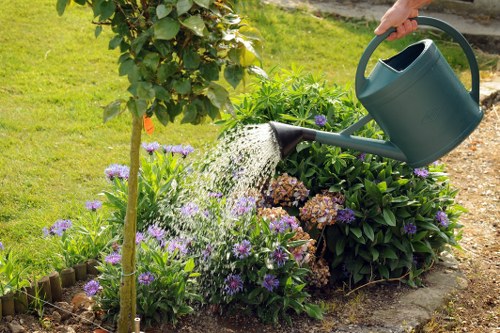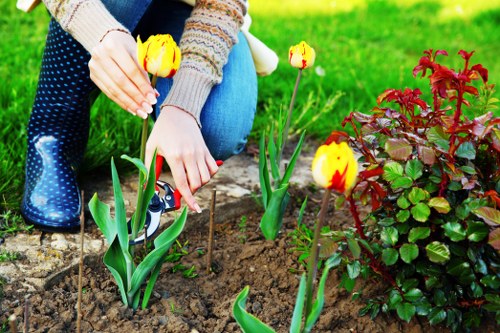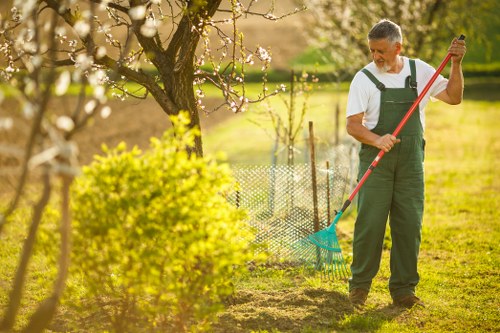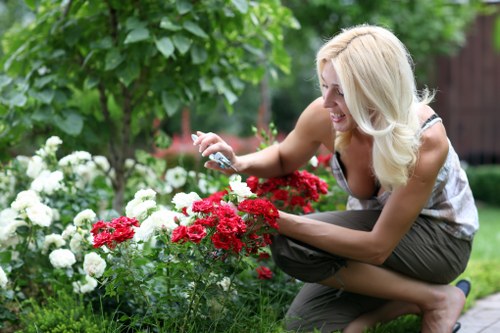Comprehensive Guide to Garden Maintenance in Notting Hill
Introduction to Garden Maintenance

Maintaining a beautiful garden in Notting Hill requires a blend of passion, knowledge, and the right techniques. The area's unique climate and urban environment present both challenges and opportunities for garden enthusiasts.
Whether you're a seasoned gardener or a beginner, understanding the fundamentals of garden maintenance is crucial for creating a thriving outdoor space. This guide offers insights tailored specifically to the needs of Notting Hill residents.
From soil preparation to plant selection, we'll cover everything you need to know to keep your garden in top shape all year round.
Understanding the Local Climate

Notting Hill experiences a temperate maritime climate, characterized by mild winters and warm summers. This climate is ideal for a wide variety of plants, but it also means gardeners must be prepared for occasional rainfall and temperature fluctuations.
**Key Climate Factors:**
- Average temperatures range from 5°C in winter to 25°C in summer.
- High humidity levels can affect plant health.
- Rainfall is evenly distributed throughout the year.
By understanding these climate patterns, you can select plants that thrive in these conditions and implement maintenance practices that support their growth.
Soil Preparation and Management

Healthy soil is the foundation of any successful garden. In Notting Hill, the soil composition can vary, so it's essential to test your soil to determine its pH and nutrient levels.
Steps for Soil Preparation:
- Conduct a soil test to assess pH and nutrient content.
- Amend the soil with organic matter, such as compost or manure.
- Ensure proper drainage to prevent waterlogging.
Regularly monitoring and amending your soil will ensure that your plants receive the nutrients they need to flourish.
Plant Selection for Notting Hill Gardens

Choosing the right plants is crucial for maintaining a vibrant garden. In Notting Hill, gardeners have access to a diverse range of plant species that thrive in the local climate.
Popular Plant Choices:
- Roses: Known for their beauty and fragrance.
- Lavender: Adds color and attracts pollinators.
- Hostas: Excellent for shaded areas.
- Herbs: Such as basil, thyme, and rosemary for culinary uses.
Selecting a mix of perennials, annuals, and shrubs can create a balanced and enduring garden landscape.
Seasonal Garden Maintenance Tips

Each season brings its own set of maintenance tasks to ensure your garden remains healthy and attractive throughout the year.
Spring: Focus on planting new flowers, pruning shrubs, and preparing soil for summer growth.
Summer: Regular watering, weeding, and deadheading spent blooms will keep your garden looking its best.
Autumn: Harvest remaining vegetables, mulch beds, and plant cover crops to protect soil.
Winter: Protect plants from frost, plan next year's garden, and perform any necessary repairs to garden structures.
Pest and Disease Management
Maintaining a garden involves protecting your plants from various pests and diseases. Integrated Pest Management (IPM) is an effective strategy that combines biological, cultural, and chemical methods to manage pests sustainably.
Common Pests in Notting Hill: Aphids, slugs, and snails can cause significant damage to your plants if not controlled.
Effective Management Practices:
- Introduce natural predators like ladybugs and lacewings.
- Maintain plant health through proper watering and fertilization.
- Use organic pesticides as a last resort.
Garden Tools and Equipment
Having the right tools can make garden maintenance much more manageable. Investing in quality equipment ensures that tasks are completed efficiently and effectively.
Essential Tools:
- Pruning shears for trimming and shaping plants.
- Garden fork and spade for soil preparation.
- Watering can or hose for consistent irrigation.
- Weeder to remove unwanted plants.
Regularly maintaining your tools prolongs their lifespan and ensures they perform optimally when needed.
Professional Garden Maintenance Services
While DIY garden maintenance is rewarding, sometimes hiring professionals can save time and ensure the job is done right. In Notting Hill, several gardening services specialize in various aspects of garden care.
Benefits of Hiring Professionals:
- Expertise in plant selection and care.
- Time-saving for busy homeowners.
- Access to specialized equipment and resources.
- Ongoing maintenance plans tailored to your garden's needs.
Consider reaching out to a local gardening service to discuss how they can help maintain and enhance your outdoor space.
Sustainable Gardening Practices
Adopting sustainable practices not only benefits the environment but also contributes to the long-term health of your garden.
Key Practices:
- Composting kitchen and garden waste to enrich soil.
- Using rainwater harvesting systems for irrigation.
- Choosing native plants that require less water and maintenance.
- Reducing chemical use by opting for organic fertilizers and pest control methods.
Implementing these strategies can lead to a more resilient and eco-friendly garden.
Enhancing Garden Aesthetics
Creating an attractive garden involves more than just plant selection. Incorporating elements like garden structures, pathways, and decorative features can elevate the overall look of your outdoor space.
Ideas to Enhance Your Garden:
- Install a pergola or arbor for shade and structure.
- Add stone pathways to guide visitors through the garden.
- Use garden lighting to highlight key features at night.
- Incorporate water features like fountains or ponds for added tranquility.
These enhancements can create a more inviting and visually appealing garden environment.
Year-Round Garden Care
Consistent maintenance throughout the year ensures that your garden remains healthy and vibrant. Establishing a seasonal care routine can help you stay on top of necessary tasks.
Monthly Maintenance Checklist:
- Check for signs of pests or diseases.
- Prune and trim plants as needed.
- Fertilize soil to replenish nutrients.
- Water plants according to their specific needs.
By following a regular maintenance schedule, you can prevent issues before they become significant problems and enjoy a thriving garden all year long.
Conclusion: Achieving a Beautiful Garden in Notting Hill
Maintaining a garden in Notting Hill is a rewarding endeavor that combines creativity, knowledge, and dedication. By understanding the local climate, preparing your soil, selecting the right plants, and implementing effective maintenance practices, you can create a stunning outdoor space.
Whether you choose to manage your garden yourself or enlist the help of professionals, the key is to stay informed and proactive in your garden care efforts.
Ready to transform your garden? Contact us today to book your garden maintenance service and take the first step towards a beautiful, thriving garden in Notting Hill.

